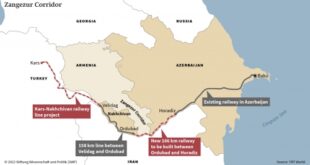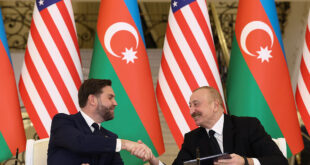Russian Foreign Minister Sergei Lavrov accused Washington on Thursday of threatening the future of the Organization for Security and Cooperation in Europe (OSCE) by rejecting reform of its election monitoring arm.President Vladimir Putin, enraged by the decision of the organization’s ODIHR election watchdog to pull out from monitoring Russia’s December 2 parliamentary polls, called on Monday for a review of the organization’s status.
U.S. Under Secretary for Political Affairs Nicholas Burns responded by saying that Washington “will not give a millimeter of opening to any proposal that will weaken the ODIHR”.
“This is not a constructive position,” Russian news agencies quoted Lavrov as saying on Thursday. “Any reluctance to step back means reluctance to make deals.”
“This is not the first time that we see such an attitude,” Lavrov added. “Unfortunately, it does not give extra hopes for the future of the OSCE.” His remarks coincided with the start of an OSCE ministerial meeting in Madrid.
Lavrov said that Russia would remain committed to its obligations and would invite observers from the Office for Democratic Institutions and Human Rights (ODIHR) to presidential polls on March 2, when Putin’s successor will be elected.
The ODIHR scrapped plans to monitor the parliamentary polls on November 16, blaming Russian obstruction and saying Moscow had failed to issue entry visas to its observer team.
Putin accused the United States of influencing the ODIHR decision — the ODIHR denied this — and of wanting to present the Russian election as illegal.
Russia has long complained that the OSCE, a security and rights body, was created in the Cold War days as a meeting point for confronting blocs and has become an instrument of Western pressure on Russia.
“We want the OSCE to match the times,” Lavrov said. “The Organization has been created long ago and should change.”
“The OSCE needs a new charter, new rules,” he added.
Disagreements over the OSCE’s future are part of a broader rift between Russia and the West, which includes clashes over the future of Serbia’s breakaway region of Kosovo and over Iran, suspected by the West of trying to produce nuclear bombs.
Pro-Kremlin politicians accuse OSCE observers of bias. After observing the last Russian parliamentary polls in 2003, the OSCE said they marked a step backwards for Russian democracy.
Increasingly influential nationalist politicians have demanded that Russia quit the OSCE.
The Kremlin has never backed such demands. But Putin reiterated at a meeting with foreign ambassadors in Moscow on Wednesday that he would not allow the West to destabilize Russia ahead of the crucial polls.
 Eurasia Press & News
Eurasia Press & News



